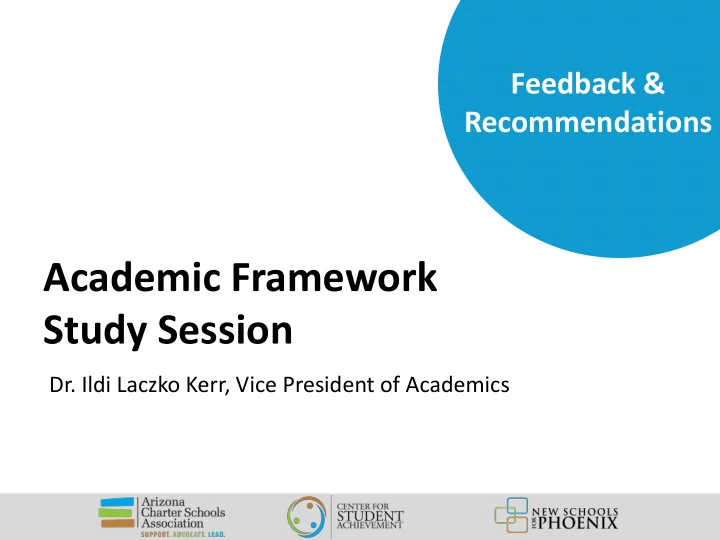

Feedback & Recommendations Academic Framework Study Session Dr. Ildi Laczko Kerr, Vice President of Academics
Association Support • The Association provides technical assistance to schools required to submit PMPs and DSPs: – Workshops: • Increase schools’ ability to complete the required submissions • Clarify directions, submission requirements and evaluation criteria for PMPs and DSPs • Schools begin to develop their submission – Document review: • External evaluation prior to submission to identify areas of improvement
Academic Framework Feedback • Academic quality is based entirely on state assessment results • Timing of two separate evaluations leads to confusion about school quality • Inconsistent feedback to schools between two statewide evaluations that use the same underlying data – A-F ratings are used inconsistently in Board decisions, i.e., “F” schools consequences • No appeal process for Academic Framework
Academic Framework Feedback • Transition concerns: – No A-F labels (2015 and 2016) • Fairness to charter schools • Impact on the Framework • Changing formula and its impact on future Frameworks – Timing of AZ MERIT results and SGP calculations will result in delayed Frameworks – SGP calculations for high schools and alternative schools (issue for ADE to resolve before data can be available for Framework) – Improvement scores for alternative schools are no longer available without AIMS retest
Academic Framework Feedback • Good 2014 A-F results, Does Not Meets Level: 32 (20%) received a “B” yet charter does not 72 (45%) received a “C” meet expectations 50 (31%) received a “D” 1 (1%) received an “F” • Poor 2014 A-F results, 5 (3%) received no letter grade yet charter meets expectations Meets Level: 121 (45%) received an “A” • Inconsistent results for 99 (37%) received a “B” C rated schools 40 (15%) received a “C” 8 (3%) received a “D” 3 (1%) received no letter grade
Academic Framework Feedback • Composite schools comparison doesn’t accurately reflect the school’s population – Significantly impacted special education – English Language Learner (proficiency levels) or – Regional impact (i.e., rural, reservation, border) • Comparison to the state average is problematic for alternative schools when 80% of alternative schools are charter schools
Academic Framework Recommendations • Determine whether the 2015 Framework will be delayed or suspended due to the timing and availability of data • Consider additional measures of school quality that can supplement assessment scores, i.e., re- enrollment/persistence rates, attendance rates, course work progress and completion (HS) • Clarify the role of A- F labels in Board’s decision making
Academic Framework Recommendations • Create a more nuanced composite school comparison that includes additional data to better evaluate school performance • For alternative schools- consider creating a state average baseline that does not change annually for a point of comparison • Consider an appeals process similar to ADE’s A-F substantive appeals
Academic Interventions DSP/PMP • No consideration for schools that are near the meets cut score- whether your 1 or 15 points away schools must complete the same information • Conflict between “tell your story” directives and “only if you present your data this way” evaluation – Directions and expectations are unclear, despite technical assistance documents • Year over year comparisons invalid between different assessment systems, yet schools are scored poorly if they don’t report
Academic Interventions: DSP/PMP • Inconsistent school improvement expectations compared to Title I, ESS, etc. • Lack of regard for other accreditation models and processes • Evaluation rubrics lack specificity and leave room for subjectivity during review process • Evidence and documentation expectations are unclear and (at times) seem unreasonable
Academic Interventions: DSP/PMP • Some DSP guiding questions are redundant and therefore cause confusion • Length of DSP (blank template is nearly 40 pages) is overwhelming and time consuming – Schools have 30 days to complete which forces schools to utilize many staff members to complete in a timely manner • PMP template is difficult to complete- formatting issues with text boxes result in lost content
Academic Interventions: DSP/PMP • Timing and feedback – Some schools are required to write DSPs within 6 months of one another – Due to the volume of PMPs and DSPs, schools may not receive timely feedback on their submission – Inconsistent feedback from staff across years results in confusion regarding the expectations PMP and DSP submissions • This leads schools to believe that there is too much subjectivity in the evaluation process
DSP/PMP Recommendations • Tier schools reporting requirements based on the level of performance (Far Below and Does Not Meet) on the Framework • Differentiate the PMP and DSP requirements for schools based on: – Framework results- overall score and specific areas – Previous performance on DSP submissions or Frameworks
DSP/PMP Recommendations • Clarify expectations for content and data by providing exemplars for schools to review prior to submission • Develop reasonable expectations for school improvement reporting – Focus reporting on priority areas- not all areas can be addressed simultaneously • Consider DSP submissions in two phases – Phase 1: Data Review, if data meet then no additional submissions required – Phase 2: If data review does not meet, complete template specifically addressing areas that do not meet
DSP/PMP Recommendations • Consider a peer-review process for DSP evaluations to increase capacity, timeliness and transparency • Consider other external evaluations of school quality- accreditations, etc. in the evaluation of schools’ performance • Identify essential questions for the DSP template and eliminate redundant or confusing questions
Questions?
Recommend
More recommend